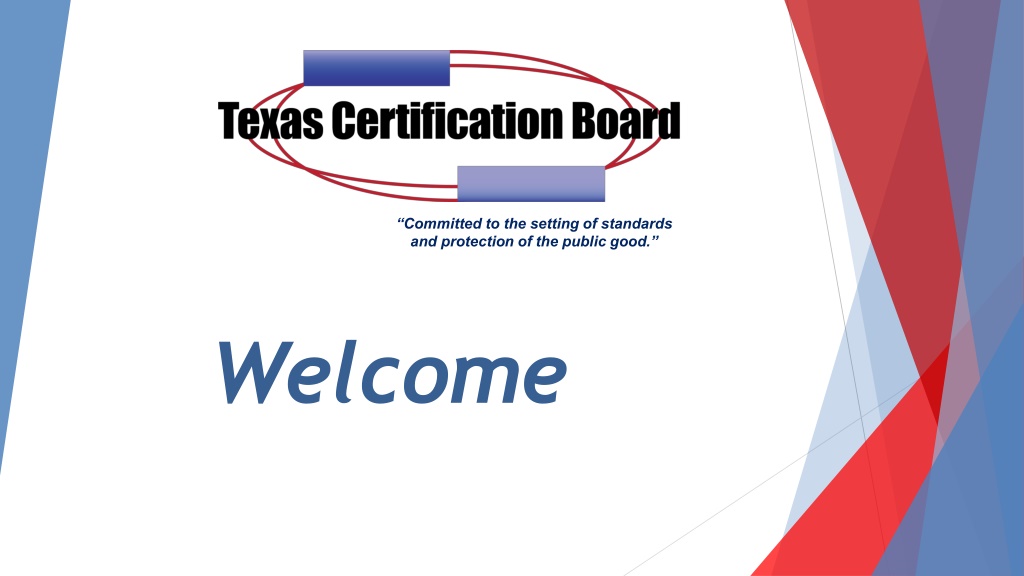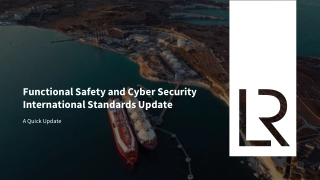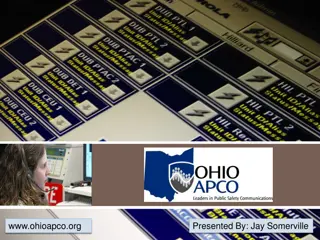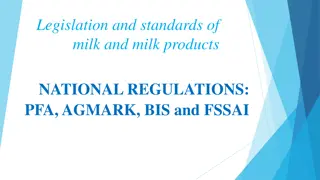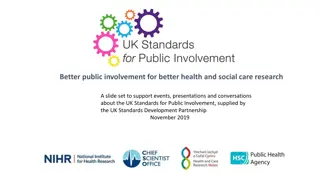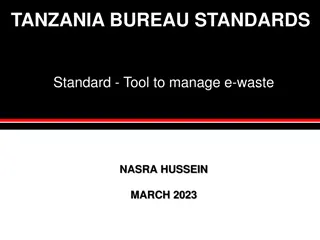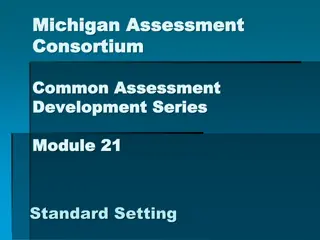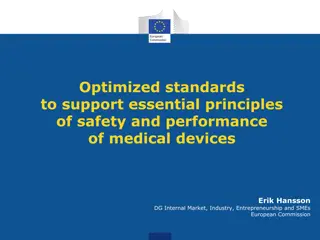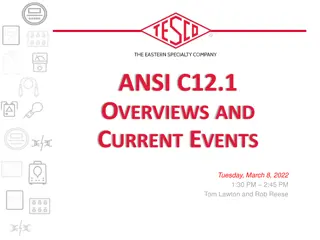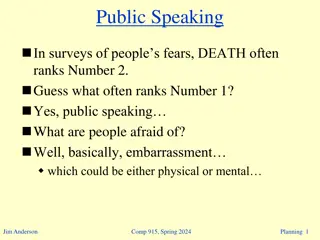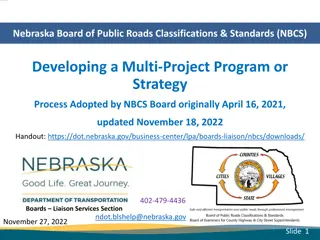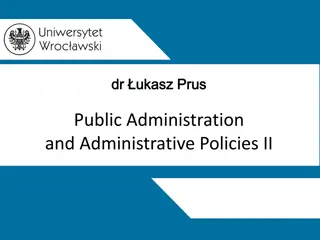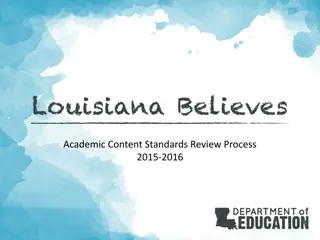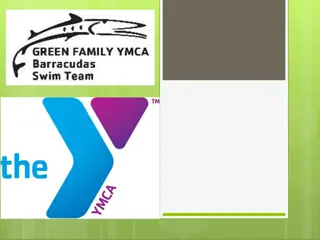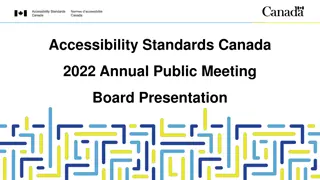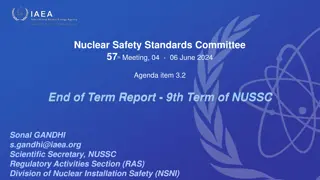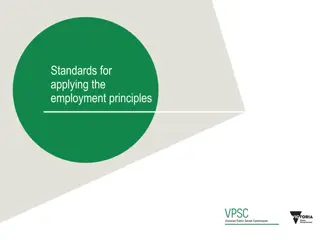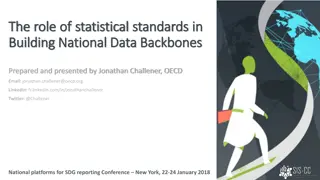Setting Standards for Public Good
Protecting the public good by establishing and upholding standards is our commitment. Join us in our mission to ensure a safe and reliable environment for all. Our focus is on setting high-quality benchmarks and safeguarding the interests of society. Be part of a community dedicated to excellence and accountability in every aspect of public services and welfare.
Download Presentation

Please find below an Image/Link to download the presentation.
The content on the website is provided AS IS for your information and personal use only. It may not be sold, licensed, or shared on other websites without obtaining consent from the author.If you encounter any issues during the download, it is possible that the publisher has removed the file from their server.
You are allowed to download the files provided on this website for personal or commercial use, subject to the condition that they are used lawfully. All files are the property of their respective owners.
The content on the website is provided AS IS for your information and personal use only. It may not be sold, licensed, or shared on other websites without obtaining consent from the author.
E N D
Presentation Transcript
Committed to the setting of standards and protection of the public good. Welcome
What is the Texas Certification Board ? The Certification Board Administers the certification system; Participates in the administration and enforcement of Professional Codes of Ethics; Reviews the Standards of Examination and revises where appropriate; Sets testing, certification and designation fees and rates; Negotiates for recognition of certification and reciprocity agreements with other certifying associations, agencies, boards and professional organizations.
What does the Texas Certification Board do? Upgrades and standardizes the qualifications of those working in areas related to substance use disorder counseling, clinical supervision, prevention, peer support and other health professions throughout Texas. Administers professional certification exams and provides supporting materials. Sets the standards and guidelines for continuing education providers. Updates, monitors and enforces professional ethics.
Who is on Texas Certification Board ? The TCB is composed of nine elected volunteers who represent a diversity of prevention, treatment, and recovery services, functions, geographical areas, ethnicity and gender. Additional Allied Health Professionals also volunteer to serve on various committees. These committees include Standards, Ethics, Diversity, Equity & Inclusion, Prevention, Criminal Involved, Peer Support and Marketing.
Standards Committee The Standards Committee coordinates, reviews and makes recommendations regarding Credential, Continuing Education Provider and Peer Training Entity standards for the purpose of public protection. The Standards Committee also randomly audits Continuing Education Providers and Peer Training Entities to ensure standards are being adhered to.
Ethics Committee The Ethics Committee receives all ethical complaints, notifies the credentialed individual or training entity about the complaint against them, conducts a closed door review and reports the final disposition to the TCB and the individual or training entity. The final disposition may include a dismissal of the complaint, a formal reprimand, a revocation or suspension of the credential, or other corrective action. The committee also reports the complaint to the appropriate regulatory agencies as required by law and or regulation.
Diversity, Equity & Inclusion Committee The Diversity, Equity and Inclusion Committee works with all TCB committees to support Diversity, Equity and Inclusion protocols with all credentialed staff, support staff, services and individuals served. The Committee: Reviews TCB operations policies and procedures. Provides education and orientation to all new Continuing Education Providers, Peer Training Entities, Trainees, Care and Treatment facilities that partner with or are certified by TCB. Supports TCB committees when investigating complaints or concerns regarding disparity in the form of discrimination, non-inclusion or equity.
Prevention Committee The Prevention Committee supports prevention programs and agencies in their efforts to provide evidence-based prevention strategies to meet personnel requirements and ensure competent prevention credentialed staff. The Committee: Reviews and clarifies prevention credential requirements and policies to ensure compliance and alignment with IC&RC prevention credential standards. Recommends revisions of TCB prevention credential requirements based on IC&RC prevention job analyses and Code of Ethics updates. Provides input to state agency regarding varying levels of prevention credential standards. Provides technical assistance as requested for audits of approved prevention training providers.
Criminal Involved Committee The Criminal Involved Committee assists in the efforts to support criminal justice agencies in their efforts to meet law requirements as it applies to credentialed staff and support services for the justice-involved population. The committee: Reviews and updates criminal justice credential requirements and policies to ensure consistent compliance with laws and standards. Provides guidance and assistance to criminal justice entities as it relates to credential compliance. Assist with any trainings or audits of organizations responsible for providing services to the justice-involved population.
Peer Support Committee The Peer Support Committee assists Peer Specialist in their efforts to meet Texas Administration Codes and TCB requirements. The Committee: Reviews and updates Peer Credential requirements and policies to ensure consistent compliance with the Texas Administrative Code Codes and TCB standards. Provides guidance and assistance to Peer Specialist and training entities as it relates to credential compliance. Assists with any trainings or audits of organizations responsible for providing services to the peer credentialed population.
Marketing Committee The Marketing Committee works to promote all the certifications offered through TCB. The Committee: Creates a state-wide marketing plan. Creates informational materials about each certification. Educates people about Texas Certifications.
Committed to the setting of standards and protection of the public good. Certification & Licensure
What is Certification? Certification is a process by which a non-governmental organization grants recognition to an individual who has met predetermined qualifications and has demonstrated a level of knowledge and skill required in a profession specified by that organization. Certification is typically a voluntary process.
Certification Represents the achievement of a level of professional competency agreed by the international community as qualified to practice effectively. Can help a professional obtain a license in some states. Can also allow a professional to more easily relocate to another state, territory or jurisdiction. https://internationalcredentialing.org/lic-cert November 2022
What is Licensure? Licensure is a governmental grant of legal authority to practice a profession within a particular scope of practice. Under a licensure system, a government will define by statute the tasks and function or scope of practice of a profession and these tasks may be legally performed only by those holding that license. It is required in order to practice or to call oneself a licensed professional. https://internationalcredentialing.org/lic-cert November 2022
Examples of Licensure in Texas Programs Licensed by TDLR Cosmetologists Auctioneers Barbers Electricians Massage Therapy Midwives Tow truck operators Programs Licensed by Tx BHEC Licensed Professional Counselors Marriage and Family Therapists Social Workers Programs Licensed by TxHHSC Chemical Dependency Counselors Chemical Dependency Treatment Facilities
Why get certified? Ability to transfer certification to other states and jurisdictions. International recognition of a competency based certification. Recognition of a specific area of practice and higher level of education.
The Value of Credentialing 1. Ensuring the publics safety. 2. Enhancing Public Funds Accountability 3. Providing Practitioner Benefits Quality care requires a competent workforce that is well trained, educated, and skilled in providing appropriate services. https://internationalcredentialing.org/valuecred November 2022
1. Ensuring the Public's Safety Government agencies and community-based organizations that adopt and enforce practice standards through the requirement of credentialing assure appropriate and effective service delivery for the recipients of substance use disorder services. A strong ethical code among prevention, substance use treatment, and recovery professionals protects consumers of services from other forms of professional misconduct. https://internationalcredentialing.org/valuecred November 2022
2. Enhancing Public Funds Accountability Ethical practice demands accountability for public expenditures, and accountability dictates that governments and their programs utilize staff who demonstrate proficiency with competency-based standards. Credentialing aligns practice with the rapid advancements in the field, keeping pace with newly available data. https://internationalcredentialing.org/valuecred November 2022
3. Providing Practitioner Benefits Prevention, substance use treatment, and recovery professionals are able to demonstrate practice competencies in their daily work. Through the continuing education required for renewal of certification, practitioners are able to maintain their knowledge, skills and abilities while staying abreast of new and emerging trends in the field. https://internationalcredentialing.org/valuecred November 2022
Complimentary Processes Licensing and certification processes often co-exist in a single jurisdiction and complement one another. One example of this is when a state recognizes the existing credentialing organization that provides a stringent, legally defensible, reliable and valid credentialing process. https://internationalcredentialing.org/lic-cert November 2022
Committed to the setting of standards and protection of the public good. IC&RC International Certification and Reciprocity Consortium
IC&RC- INTERNATIONAL CERTIFICATION & RECIPROCITY CONSORTIUM IC&RC is an international non-profit organization that promotes public protection by developing internationally recognized credentials and examinations for prevention, substance use disorder treatment, and recovery professionals. The Texas Certification Board is a proud member of IC&RC, the global leader in the credentialing of substance use disorder prevention, treatment and recovery professionals. https://internationalcredentialing.org/page-1738918 November 2022
IC&RC- INTERNATIONAL CERTIFICATION & RECIPROCITY CONSORTIUM IC&RC develops examinations, sets minimum credentialing standards, and facilitates reciprocity for certified professionals for the following credentials: 1. ALCOHOL & DRUG COUNSELOR (ADC) 2. ADVANCED ALCOHOL & DRUG COUNSELOR (AADC) 3. CLINICAL SUPERVISOR (CS) 4. PREVENTION SPECIALIST (PS) 5. CERTIFIED CRIMINAL JUSTICE ADDICTIONS PROFESSIONAL (CCJP) 6. PEER RECOVERY (PR) https://internationalcredentialing.org/page-1738918 November 2022
Reciprocity Professionals that hold eligible certifications are able to transfer their credentials between IC&RC Member Boards. IC&RC certification boards are in 49 U.S. states and territories, three Native American regions, all branches of the U.S. military and 11 international regions. https://internationalcredentialing.org/memberboards/ November 2022
International Certificate Holding an IC&RC recognized credential through an IC&RC Member Board can entitle you to an International Certificate. International Certificates can be used by professionals to signify their international, reciprocal status and gain greater professional recognition. https://internationalcredentialing.org/certifiedprofessionals November 2022
Committed to the setting of standards and protection of the public good. Current Texas Certifications https://www.tcbap.org/page/certification November 2022
Current Texas Certifications Advanced Alcohol and Drug Counselor (AADC) * Certified Criminal Justice Addictions Professional Applicant Status (CCJP-A) Alcohol and Other Drug Abuse Counselor (ADC) * Certified Criminal Justice Addictions Professionals (CCJP) * Peer Recovery Support Specialist (PRSS) * Advanced Certified Prevention Specialist (ACPS)* Re-Entry Peer Specialist (JI-RPS) Mental Health Peer Specialist (MHPS) Certified Prevention Specialist (CPS)* Recovery Support Peer Specialist (RSPS) Associate Prevention Specialist (APS) Peer Specialist Supervisor (PSS) Certified Clinical Supervisor (CCS) * Clinical Supervisor Designation (CSD) * Indicates reciprocity with IC&RC
Alcohol and Drug Counselor Advanced Alcohol and Drug Counselor (AADC) * The AADC credential will separate those counselors who are content with a status quo existence from those who continue to achieve a higher level of excellence within the addiction profession. * Indicates reciprocity with IC&RC
Advanced Alcohol and Drug Counselor (AADC) * Master s degree - Human Services Behavioral Sciences field with clinical application. 180 AOD Specific course work - 6 hrs Ethics & 6 hrs HIV/AIDS, STD s and Hepatitis. 2,000 hours supervised work experience in Alcoholism and Drug Abuse counseling field. 300 hour Chemical Dependency Counseling Practicum. Passing score on the ICRC AADC Exam. * Indicates reciprocity with IC&RC
Alcohol and Drug Counselor Alcohol and Other Drug Abuse Counselor (ADC) * The primary purpose of the credential is to raise the standards of education and experience levels so that individual counselors with exceptional experience or education can be duly recognized by their peers and professional organizations, statewide and nationally. * Indicates reciprocity with IC&RC
Alcohol Drug Counselors (ADC) * 300 hour Chemical Dependency Counseling Practicum. 270 education hours (135 AOD, 6 HIV/AIDS, 6 Ethics). 6,000 hrs of chemical dependency counseling experience (associate s substitutes for 1,000 hours; a bachelor s for 2,000 hours; a master s for 4,000 hours). Degree must be in behavioral science. Passing score on ICRC ADC exam. * Indicates reciprocity with IC&RC
Prevention Specialist Certified Prevention Specialist (CPS) * The CPS shall be viewed as a fully qualified specialist in the area of prevention and able to provide these services independently or with minimal supervision, to the degree allowed by applicable laws, statutes and regulations. The CPS is designed to be appropriate for those professionals currently practicing in the prevention field. A CPS is a health care professional who has been certified by TCB as having been adequately trained to provide prevention education training. * Indicates reciprocity with IC&RC
Certified Prevention Specialist (CPS) * 120 prevention continuing education hours (90 Prevention hrs, 24 AOD hrs, 6 Prevention Ethics hrs). 120 hour supervised Practicum. 2,000 hours Alcohol, Tobacco and Other Drug (ATOD) prevention work experience. Passing score on the IC&RC Prevention Specialist (PS) Examination. * Indicates reciprocity with IC&RC
Prevention Specialist Advanced Certified Prevention Specialist (ACPS) * The ACPS is a TCB credential to recognize prevention specialists who have completed additional degree work. The ACPS shall be viewed as a fully qualified specialist in the area of prevention and able to provide these services independently or with minimal supervision, to the degree allowed by applicable laws, statutes and regulations. * Indicates reciprocity with IC&RC
Advanced Certified Prevention Specialists (ACPS) 200 Prevention, 24 hours Alcohol and Other Drug (AOD), 6 Prevention Ethics education hours. AOD Work Experience - Associates Degree + 10,000 hours OR Bachelor s, Master s or Doctoral Degree + 4,000 hours. 120 hour supervised Practicum. Passing score on ICRC Prevention Specialist (PS) Exam.
Prevention Specialist Associate Prevention Specialist (APS) The APS designation is intended for individuals pursuing competency in the field of substance abuse prevention or those with sustained employment in the field. APS designation is available for current prevention staff who are interested in pursuing this designation including staff currently employed at a substance abuse prevention entity.
Associate Prevention Specialist (APS) 120 prevention continuing education hours - 90 Prevention, 24 AOD, 6 Prevention Ethics. 120 hour supervised Practicum. 3,000 hours of substance abuse prevention work experience. Supervisor s competency evaluation. A minimum of a High School Diploma or GED.
Criminal Justice Certified Criminal Justice Addictions Professional Applicant Status (CCJP-A) A CCJP-A status may be issued to an individual who has met the educational and practicum requirements for the Texas CCJP, but has not yet passed the exam and may still be working on direct service/work experience hours. The CCJP-A applicant status will be issued for a period of five (5) years, in which time you must meet the requirements for and pass the written IC&RC CCJP exam for the full Texas CCJP.
Certified Criminal Justice Addictions Professional Applicant (CCJP-A) Training/education hours Doctoral/AAC (60+); Master s/CCS/MAC/NASW (100+); Bachelor s/ADC/LCDC (150+); Associate s (200+); HS Diploma (270+). Practicum hours Doctoral/AAC (N/A); Master s/CCS/MAC/NASW (80); Bachelor s/ADC/LCDC (150); HS Diploma (200). Passing score on IC&RC ADC Exam Must attempt the supplemental IC&RC CCJP exam within the first 2 years.
Criminal Justice Certified Criminal Justice Addictions Professionals (CCJP) * This credential was designed in close collaboration with TCB and Criminal Justice Professionals to meet their specific and unique needs. It is our hope that this certification will allow employers and those they serve to recognize those professionals whose expertise includes the unique blend of substance abuse issues and those related more specifically to criminal justice. * Indicates reciprocity with IC&RC
Certified Criminal Justice Addictions Professional (CCJP) * Training/education hours Doctoral/AAC (60+); Master s/CCS/MAC/NASW (100+); Bachelor s/ADC/LCDC (150+); Associate s (200+); HS Diploma (270+). Practicum hours Doctoral/AAC (N/A); Master s/CCS/MAC/NASW (80); Bachelor s/ADC/LCDC (150); HS Diploma (200). Work experience hours Doctoral/AAC (1,000); Master s/CCS/MAC/NASW (2,000); Bachelor s/ADC/LCDC (4,000); Associate s (5,000); HS Diploma (6,000). Passing score on the ICRC ADC Exam and ICRC CCJP Supplemental Exam * Indicates reciprocity with IC&RC
Clinical Supervisor Certified Clinical Supervisor (CCS) * The CCS credential upgrades and standardizes qualifications of those working in the field of supervision. In a treatment setting, the CCS shall improve the quality of supervision of interns, enhance the credibility of the practicum experience and provide greater relevance for certification. The CCS certification is designed to be appropriate for those individuals who are currently supervising counselor interns. * Indicates reciprocity with IC&RC
Certified Clinical Supervisors (CCS) * Current certification as an ADC, AADC, or CCJP. 10,000 hours Counseling experience in Addiction Counseling field. 4,000 hours Supervisory experience after ADC/AADC certification. 30 hours Didactic training in clinical supervision. 3 letters of reference, including one who supervised the candidate s clinical supervision. Passing score on the ICRC Clinical Supervision (CS) Examination. * Indicates reciprocity with IC&RC
Clinical Supervisor Clinical Supervisor Designation (CSD) The Clinical Supervisor Designation credential upgrades and standardizes qualifications of those working in the field of supervision. In a treatment setting, the CSD shall improve the quality of supervision of interns, enhance the credibility of the practicum experience and provide greater relevance for certification. The CS designation is designed to be appropriate for those individuals who are currently, and will be, supervising counselor interns and practicum students. The CSD is a healthcare professional who has been designated by TCB as having been adequately trained to provide supervision for counselor interns and practicum students. * Indicates reciprocity with IC&RC
Peer Support Peer Recovery Support Specialist (PRSS) * The PRSS credential standardizes qualifications of those working in peer recovery support within the field chemical dependency, mental health, and/or co-occurring disorders. The credential demonstrates a higher level of competency through the passing of an IC&RC exam. * Indicates reciprocity with IC&RC
Peer Recovery Support Specialist (PRSS) * 46 education hours specific to the PRS domains. 500 hours of volunteer/paid work experience. 25 hour supervised practicum. Passing score on the ICRC Peer Recovery exam. Minimum of a high school diploma. * Indicates reciprocity with IC&RC
Peer Support Re-Entry Peer Specialist (JI-RPS) Re-Entry Peer Specialists support participants with a mental health and/or substance use challenge that have been incarcerated (jail or prison) toward long-term recovery. * Indicates reciprocity with IC&RC
Re-Entry Peer Specialist (JI-RPS) Lived experience with incarceration and demonstrate current self-directed recovery. Successful completion of Re-Entry Peer Specialist training. Minimum of a high school diploma. Copy of state-issued ID.
